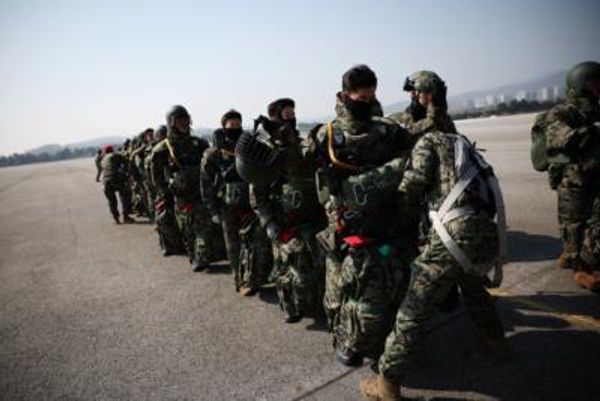
More than 870,000 Ukrainians have fled the country since war broke out a week ago. The United Nations estimates the conflict will create four million refugees with another 12 million people requiring relief and protection within the country.
The EU is expected to grant temporary protection to all Ukrainian refugees, who are waiting up to 60 hours at border crossings in freezing temperatures in Poland, Hungary, Moldova, Slovakia and Romania. Poland has processed the majority of refugees, with more than 453,000 people crossing its border.
But nations aren’t always kind or generous when it comes to refugee policy. Ukraine is the eighth-most populous country in Europe, with 44 million people, and the conflict is set to cause Europe’s largest internal refugee crisis this century.
Who is responsible for Ukrainian refugees?
With so many expected to flee Ukraine, it’s not clear how many people countries will accept, or for how long. Many of the bordering nations accepting refugees, including Moldova and Hungary, have low GPDs and struggle to support their own residents, let alone an influx of refugees.
“There’s a question of the hierarchy of responsibility and need, and it’s a political question as much as one of economic destitution,” University of Sydney migration expert Anna Boucher tells Crikey.
There’s a gendered element to the outpouring of refugees, Boucher said. Men of fighting age are not permitted to leave Ukraine, leaving women as the sole carers for displaced children. It’s not clear how many of those will need welfare support versus how many will be able to work in the long term. “The economic costs could be huge on those neighbouring countries,” Boucher said.
It’s similar to what played out in Germany across the 2015 Syrian refugee crisis: “We’ll manage this,” then-chancellor Angela Merkel said in 2015, announcing Germany was open to refugees. But within months, Germany shut its borders as thousands fled the Middle East.
Countries’ willingness to support Ukrainians could also depend on how ethnically diverse the country is, and how closely tied it is to Ukraine, Boucher said — whether there’s high migration or reliance on seasonal workers and high rates of marriage between ethnic groups and mixed families. There are typically a lower levels of multiculturalism in former-USSR nations.
The United Nations has announced a $2 billion donation appeal to assist Ukrainians and bordering nations assisting refugees.
Are Ukrainians getting preferential treatment?
On one side of Poland, Ukrainian refugees are being welcomed and processed by officials. On the other, a border is being built to stop refugees from the Middle East entering via Belarus.
Ukrainian officials have been accused of discriminatory behaviour, with Africans who have been living in Ukraine saying they have been pushed to the back of queues at the border, while Polish officials have been accused of refusing Nigerians entry to the country.
The difference in treatment of refugees across Eastern Europe is stark: Bulgarian Prime Minister Kiril Petkov has called the Ukrainian refugees “intelligent” and “educated”, saying they differed from previous waves of refugees from the Middle East who “could have even been terrorists”.
“There’ll be at least some people who might perceive this as racialised because Ukrainians are European,” Boucher said.
The rhetoric in Australia is also stark: we’ve announced $70 million in military assistance to support Ukraine’s defence and $35 million for humanitarian assistance, with Prime Minister Scott Morrison flagging a special “fast-track” intake on top of Australia’s existing annual humanitarian allocation for Ukrainian refugees.
But last month, Immigration Minister Alex Hawke said just 15,000 Afghans would receive humanitarian and family migration visas across the next four years — more than 1000 of which have already been given to a backlog of applicants and to employees who assisted the Australian Defence Force. Australia has accepted 28,000 fewer refugees than promised since 2019 thanks to COVID-19.
No extra announcements for Afghan refugees have been made even as the humanitarian crisis deepens as a result of sanctions following the Taliban takeover. Across the weekend in Kabul the Taliban conducted armed raids searching for those who may have worked for the former regime.
“There are huge backlogs of Afghan refugees seeking family reunification, so I can see [fast-tracking Ukrainian visas] becoming an issue for those communities here in Australia,” Boucher said.
“Anything Australia does is going to be like a drop in the ocean … and maybe that’s what the government is thinking, that it’s important to be symbolic.”
A brief history of whitewashing refugees
Daniel Ghezelbash, a refugee lawyer and founder of Macquarie University’s Social Justice Clinic, told Crikey that generally Australians are supportive of bringing people through humanitarian programs, but that visas take a long time largely thanks to the program’s highly discretionary nature.
Australia ranks 26th in the world for resettling refugees, and our intake has dropped from pre-pandemic levels of 94 refugees per 100,000 people to just 23.4 in 2020. Our current intake cap of 13,750 refugees per year is the lowest in more than 50 years.
Despite the low intake cap, Australia has been quick to voice support for certain kinds of refugees in recent years.
An estimated 15% of refugees fleeing Iraq and Syria between 2015 and 2016 were Christian. Yet of the 18,500 refugees accepted by Australia, 78% identified as Christian.
In 2018, then-home affairs minister Peter Dutton said white Zimbabwean farmers deserved “special attention” for migration to Australia following a series of murders in an attempt to redistribute land to black South Africans. The United Nations high commissioner for refugees rebuffed Dutton’s remarks, calling for a focus on “those who are truly vulnerable and in need of protection and a solution”, such as children on Nauru.
Ghezelbash said a country’s wealth should determine how many refugees it supports, versus simply how close a country is to the conflict.
“But every country should be stepping up to help alleviate the pressures on neighbouring states, not just in terms of Ukraine but refugee-producing events all around the world,” he said.







